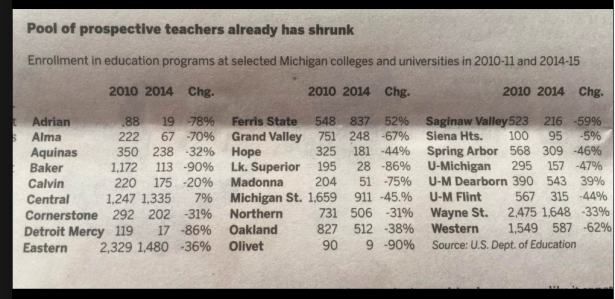
I am a teacher in Michigan and these statistics have been floating around Facebook this week. These numbers are disturbing for sure and, as a parent, makes me worry about the quality of education my children will have access to in the next 10 years.

Related to this, however, is another issue that I’ve been ruminating on for some time. The question is, “If a student tells you they want to be a teacher, what do you say?” Over the past year I’ve heard co-workers passionately tell me why they encourage these students and also co-workers who believe these students should be discouraged from entering the profession. I personally love teaching, so when kids tell me their intentions, my gut reaction is usually excitement. But I’ve started to wonder if I’m doing them a disservice. Should I be discouraging students from entering this profession?
But first, a story….
When I was in college I had a job that allowed me to provide extra-curricular and supplemental activities for the students at an urban elementary school. I ran an afterschool program and one of the clubs I organized was called Girl Power. During one of the activities the kids were telling us what they wanted to be when they grew up. One girl said she wanted to be a host, like the host of a TV show. Thinking I was helping her, I said, “well you can’t just be a host. Usually those people are celebrities or go into broadcasting first.” Afterwards, a teacher who co-taught the club with me, pulled me into the hall and said, in no uncertain terms, “don’t ever tell these kids they can’t do something.” I tried to make my case (I really did think I was helping), but she insisted that it was not my job to shoot them down (something many of them were used to, thanks to life), but to build them up, support them, and encourage their ideas and dreams. Obviously, now that I’m older I agree and see the errors of my ways, but I remember this whenever I hear co-workers tell me that they always discourage students from going into teaching.
I went to college to be a veterinarian and it was there that I switched to English education and truly found my calling. Similar to the girl from my past, our job is to encourage them to take the next steps, to explore a road not taken. Maybe an interest in teaching gets them to college and maybe they follow-through, maybe they don’t, but college will certainly provide them many alternatives.
Additionally, one thing that drives most teachers crazy is the devaluing of the profession. Homeschooling offends me because it suggests anyone can do this job. Many people seem to think that because they went to school, they know what teaching is all about. If you aren’t a certified teacher, you don’t know the years of study about learning theories and the research about best practice. You haven’t been exposed to some basic brain development principles or developmental psychology. These things help to make good teachers. When you teach, you collaborate with other like-minded people and, as a result, you are always working to improve instruction. These are the things professionals know. When legislatures tell me that they’ll give certifications in exchange for service credit, or simply working the private sector, that is a huge insult to the years of hard work I’ve put in.
So when we say to kids, “You know, you can make so much more in the private sector.” or “You’re too smart. Use that science degree for something else” aren’t we doing the same thing? Aren’t we suggesting that education is a waste of intelligence or coursework? Aren’t we sending the message the using a science degree to work as a chemist or a math degree to work as an accountant are more noble or important than teaching?
This profession needs intelligent, passionate people and if we tell those types of students to follow a higher paycheck, we are ultimately hurting the future of education ourselves. Nevermind what the legislature does, we are the ones sending the message that it’s not worth it.
Now let’s be real…
I always get excited when kids tell me they want to teach, but they usually look at me like, “but should I? Really?” and I do think it is important that they know what they are getting into. One thing that veteran teachers forget is that the newest crop of teachers are not going to know any different from the status quo. So I cringe when I hear veteran teachers tell newbies, “it’s not like it used to be.” Well, that doesn’t really matter to (or help) a 23 year-old just starting out.
For example, I’m on my district’s negotiating team and every year the veteran teachers are discouraged and disgusted with the salary package we bring back. Certainly this is because they remember a time when teachers were well-paid and didn’t have to fight for steps, insurance, and cost-of-living raises every single year. But the new hires just look at me bright-eyed and say, “are we getting a step!?” and if I say yes, they are thrilled. Sure we all want to make more, but young teachers are not saddled with the burden of how things used to be. They are able to see the glass a bit more “half full” because they don’t know what the profession has lost. (and the conversation about teacher salary is one for a different post!)
I also think it’s important for kids to know what they are getting into. If one of my own kids wanted to be a teacher I would want to make sure they understand the lifestyle they are signing up for.
You are never going to get rich, you are never going to be celebrated by society, and every single day is going to be hard, BUT you will have some moments that are amazing.
You will laugh and cry and bang your head against your desk, but mostly you’ll laugh (if you’re doing it right). I’d make sure my kids know that teaching now-a-days requires a lot of self-discipline. You must be able to turn things off. You must be able to compartmentalize. You must be able to look for positives. And you must develop a skin thicker than armor.
Successful teachers today need to be smart enough to weed through the theories, the fads, the trends, and the hype. They must be able to really SEE what matters and they must be brave enough to fight for it. You must see every day as a chance to be a warrior for change and you must rise to that challenge. Then, you must find a healthy way to decompress, de-stress, and relax so that you can go in and do it again tomorrow.
You must remember that, whether you teach kindergarten or AP seniors, these are just kids. They are still learning, still growing, and still testing. They will frustrate you, but you will also love them. Some of them you can help, some of them you’ll never reach. You must understand that society expects more of you. You will not get to do, say, or post whatever you want on social media, but the the tradeoff is that it is because you are leading the next generation.
And if you can do all of these things you will reap the rewards of watching kids succeed, grow, change, and grow up to become amazing human beings. It’s hard and some days you’ll wonder if it’s worth it.
That’s what I’d tell my kids, if I had time. That’s what I want today’s kids to know about teaching. Sure there will be salary fights, pension fights, standardized tests, rude parents, idiotic legislatures, long hours, and few thank you’s, but whenever I consider doing something else, I just can’t imagine being happy in any other profession.

I feel exactly the same! Tried out jobs in too many fields only to find my heart in this. Thanks for your sharing!
LikeLike
The intricately designed silver utensils and cutlery symbolize aristocracy. Meanwhile, the stainless-steel products are known for their versatility and durability. It was not possible for crafts homeowners to avail these housewares under one roof, until the handicrafts gift fair bought forth an effective solution to this problem. These gift-fairs display collections of exclusive housewares from different states
LikeLike